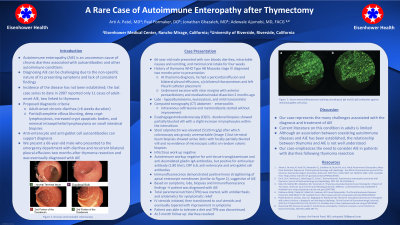Sunday Poster Session
Category: Small Intestine
P1539 - A Rare Case of Autoimmune Enteropathy After Thymectomy
Sunday, October 27, 2024
3:30 PM - 7:00 PM ET
Location: Exhibit Hall E

Has Audio
.jpg)
Arti A. Patel, MD
Eisenhower Health
Fremont, CA
Presenting Author(s)
Arti A. Patel, MD1, Paul E. Formaker, DO2, Jonathan Abaya Ghazaleh, MD3, Adewale Ajumobi, MD, FACG3
1Eisenhower Health, Fremont, CA; 2Eisenhower Health, Palm Desert, CA; 3Eisenhower Health, Rancho Mirage, CA
Introduction: Autoimmune enteropathy (AIE) is a rare cause of chronic diarrhea associated with autoantibodies and linked to other autoimmune diseases. Diagnosis is challenging due to non-specific symptoms and inconsistent findings.
Case Description/Methods: A 66 year old man with history of recently resected stage IV thymoma, pericardial and bilateral pleural effusions presented to the emergency department (ED) with a four week history of non-bloody diarrhea, nausea, and vomiting. He had a resection of his thymoma two months prior to presentation. Initial testing showed hypoalbuminemia, leukocytosis, and mildly elevated transaminases. Stool GI panel was negative. He was started on ceftriaxone and metronidazole for suspected enterocolitis but he did not improve. Duodenal biopsies from esophagogastroduodenoscopy (EGD) showed partially blunted villi with a slight increase in lymphocytes. Due to elevated calprotectin levels (5120), a colonoscopy was performed. Terminal ileum and colon mucosa appeared grossly normal. Terminal ileum biopsies showed active ileitis with focal partially blunted villi. There was no evidence of microscopic colitis on random colon biopsies. Autoimmune workup was negative for anti-tissue transglutaminase and anti-deamidated gliadin IgA antibodies, but positive for antinuclear antibody (1:80 titer), anti-enterocyte and anti-goblet cell antibodies. Total parenteral nutrition (TPN) was started as he was unable to tolerate a diet, along with antiemetics and antidiarrheals for symptomatic relief. Methylprednisolone was initiated for a total of 3 days followed by daily oral prednisone. Subsequently, his diarrhea was controlled and he was able to tolerate meals orally. TPN was discontinued before his discharge from the hospital.
Discussion: Our case illustrates the challenges associated with diagnosing and treating autoimmune enteropathy. Literature on autoimmune enteropathy in adults remains limited, especially regarding its association with thymoma. Our case emphasizes the need to consider autoimmune enteropathy in patients with diarrhea following thymoma resection.
Disclosures:
Arti A. Patel, MD1, Paul E. Formaker, DO2, Jonathan Abaya Ghazaleh, MD3, Adewale Ajumobi, MD, FACG3. P1539 - A Rare Case of Autoimmune Enteropathy After Thymectomy, ACG 2024 Annual Scientific Meeting Abstracts. Philadelphia, PA: American College of Gastroenterology.
1Eisenhower Health, Fremont, CA; 2Eisenhower Health, Palm Desert, CA; 3Eisenhower Health, Rancho Mirage, CA
Introduction: Autoimmune enteropathy (AIE) is a rare cause of chronic diarrhea associated with autoantibodies and linked to other autoimmune diseases. Diagnosis is challenging due to non-specific symptoms and inconsistent findings.
Case Description/Methods: A 66 year old man with history of recently resected stage IV thymoma, pericardial and bilateral pleural effusions presented to the emergency department (ED) with a four week history of non-bloody diarrhea, nausea, and vomiting. He had a resection of his thymoma two months prior to presentation. Initial testing showed hypoalbuminemia, leukocytosis, and mildly elevated transaminases. Stool GI panel was negative. He was started on ceftriaxone and metronidazole for suspected enterocolitis but he did not improve. Duodenal biopsies from esophagogastroduodenoscopy (EGD) showed partially blunted villi with a slight increase in lymphocytes. Due to elevated calprotectin levels (5120), a colonoscopy was performed. Terminal ileum and colon mucosa appeared grossly normal. Terminal ileum biopsies showed active ileitis with focal partially blunted villi. There was no evidence of microscopic colitis on random colon biopsies. Autoimmune workup was negative for anti-tissue transglutaminase and anti-deamidated gliadin IgA antibodies, but positive for antinuclear antibody (1:80 titer), anti-enterocyte and anti-goblet cell antibodies. Total parenteral nutrition (TPN) was started as he was unable to tolerate a diet, along with antiemetics and antidiarrheals for symptomatic relief. Methylprednisolone was initiated for a total of 3 days followed by daily oral prednisone. Subsequently, his diarrhea was controlled and he was able to tolerate meals orally. TPN was discontinued before his discharge from the hospital.
Discussion: Our case illustrates the challenges associated with diagnosing and treating autoimmune enteropathy. Literature on autoimmune enteropathy in adults remains limited, especially regarding its association with thymoma. Our case emphasizes the need to consider autoimmune enteropathy in patients with diarrhea following thymoma resection.
Disclosures:
Arti Patel indicated no relevant financial relationships.
Paul Formaker indicated no relevant financial relationships.
Jonathan Abaya Ghazaleh indicated no relevant financial relationships.
Adewale Ajumobi indicated no relevant financial relationships.
Arti A. Patel, MD1, Paul E. Formaker, DO2, Jonathan Abaya Ghazaleh, MD3, Adewale Ajumobi, MD, FACG3. P1539 - A Rare Case of Autoimmune Enteropathy After Thymectomy, ACG 2024 Annual Scientific Meeting Abstracts. Philadelphia, PA: American College of Gastroenterology.
